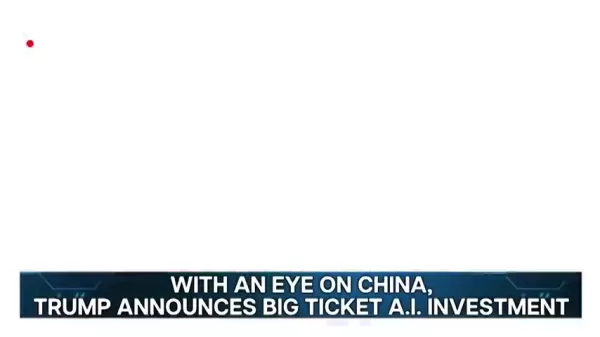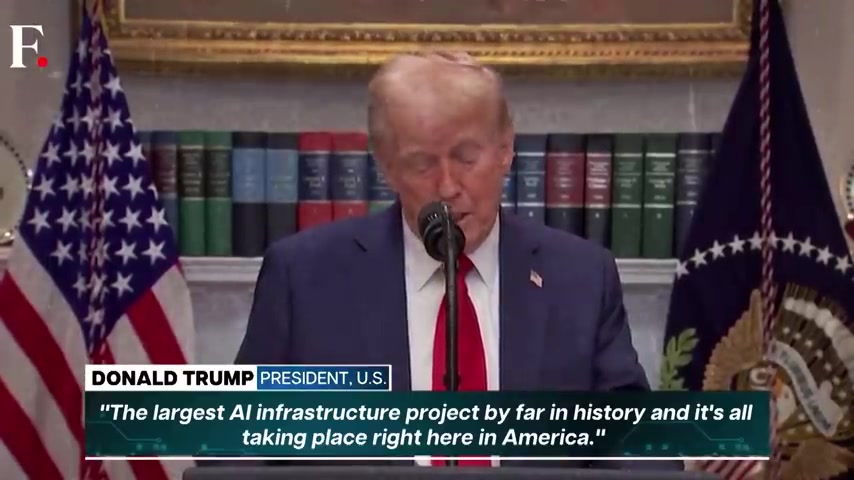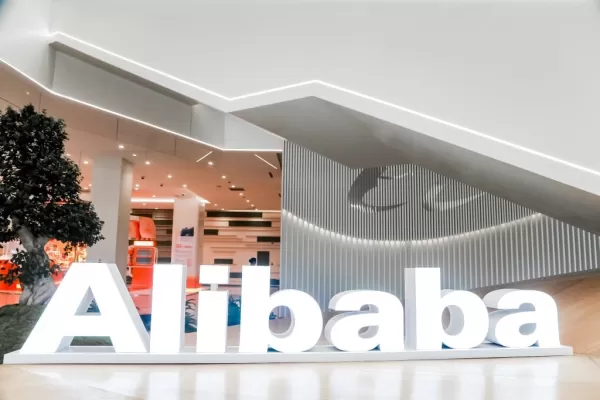Trump’s $500B Stargate Project to Lead Global AI Innovation
In an era of rapid technological progress, the race to dominate artificial intelligence (AI) has emerged as a critical geopolitical and economic challenge. The United States, under Donald Trump’s leadership, has launched the Stargate Project, a $500 billion initiative to secure American leadership in AI infrastructure. This bold effort highlights the intensifying rivalry with China to shape the future of AI technology. This article explores the Stargate Project’s scope, strategic significance, and its potential to transform the global AI landscape.
Key Points
The Stargate Project commits $500 billion to advance AI infrastructure.
Donald Trump unveiled the initiative to reinforce U.S. technological dominance.
The project focuses on building massive data centers to drive cutting-edge AI applications.
Leading partners, including OpenAI, Oracle, and SoftBank, are driving the initiative.
The effort aims to maintain U.S. leadership in AI and counter China’s advancements.
Concerns include energy consumption, water usage, and foreign investment risks.
The project may tighten export controls on AI chips to restrict China’s access to advanced technology.
Trump’s strategy seeks to establish U.S. dominance in AI innovation.
The Biden administration also backs restrictions on AI chip exports.
Unveiling the Stargate Project
What is the Stargate Project?
The Stargate Project, spearheaded by Donald Trump, is a transformative effort

to strengthen America’s position in the global AI race. With a $500 billion investment, it aims to develop state-of-the-art AI infrastructure, centered on massive data centers. These facilities will power advanced AI applications, foster innovation, and secure U.S. leadership in the AI era. The project reflects a growing partnership between government and tech giants, marking a shift toward collaboration.
Trump has described the Stargate Project as the largest AI infrastructure initiative ever, positioning the U.S. as a global leader in AI innovation. Beyond advancing technology, it emphasizes keeping AI expertise within American borders, intensifying competition with global rivals, particularly China.
Key Technology PartnersThe Stargate Project is a collaborative effort, uniting leading tech industry figures, including:
- Sam Altman: CEO of OpenAI, known for pioneering AI models like GPT.
- Masayoshi Son: CEO of SoftBank, a global investor in technology ventures.
- Larry Ellison: Chairman of Oracle, a leader in database and cloud solutions.
These partners contribute expertise, resources, and innovation, blending public and private sector strengths to achieve the project’s ambitious objectives.
The Strategic Imperative: Competing with China
The Stargate Project is a cornerstone of the U.S. strategy to outpace China in the global AI race

. As AI drives economic, military, and societal progress, leadership in this field translates to global influence.
China’s rapid AI advancements, fueled by significant investments, challenge America’s historical edge in technology. The Stargate Project aims to counter this by reinforcing U.S. dominance and ensuring a competitive advantage. Trump’s focus on AI underscores its role in trade, security, and international relations, positioning it as a pillar of national power.
Concerns and Criticisms
Potential Drawbacks and Controversies
Despite its bold vision, the Stargate Project faces scrutiny over potential challenges, including:
- Environmental Impact: Massive data centers demand significant energy and water, raising concerns about sustainability and carbon emissions.
- Foreign Investor Influence: Involvement of firms like SoftBank sparks debate over foreign influence on U.S. AI policy and technology.
- Resource Strain: The project’s energy and water demands could stress local grids and supplies, especially in resource-scarce areas.
These issues highlight the need to balance innovation with environmental and societal responsibility to ensure sustainable progress.

Trump’s AI Initiative Faces Scrutiny Over Energy, Water, and Foreign Investment Concerns.
AI Supremacy and Monopoly Concerns
The pursuit of U.S. leadership in AI raises questions about the risks of a technology monopoly. A U.S.-dominated AI landscape could limit competition, stifle innovation, and create dependencies with global implications. To address this, fostering international collaboration, open-source AI development, and ethical guidelines is essential to ensure AI benefits humanity broadly.
Practical Applications: Real-World Use Cases
Applications in Key Industries
The Stargate Project’s advanced infrastructure will enable transformative AI applications across industries, including:
- Healthcare: AI-driven diagnostics, personalized treatments, and drug discovery.
- Finance: Enhanced fraud detection, algorithmic trading, and risk assessment.
- Manufacturing: Predictive maintenance, robotics, and supply chain efficiency.
- Transportation: Autonomous vehicles, traffic optimization, and logistics improvements.
- Defense: Advanced surveillance, autonomous systems, and cybersecurity solutions.
These applications promise to boost efficiency, cut costs, and drive innovation across sectors.

AI Infrastructure to Propel Technological Advancements Across Industries.
Examining the Potential Impact: Pros and Cons
Pros
Strengthened U.S. AI infrastructure.
Accelerated innovation and global technological leadership.
Economic growth and new job opportunities.
Enhanced national security and defense capabilities.
Cons
Environmental risks from high energy and water use.
Concerns over foreign investor influence.
Potential for an AI monopoly limiting competition.
Ethical challenges in AI development and use.
Frequently Asked Questions (FAQ)
What is the Stargate Project and its primary goal?
The Stargate Project is a $500 billion U.S. initiative led by Donald Trump to establish global AI leadership. It focuses on building advanced data centers to power AI applications and compete with China.
Who are the key technology partners involved in the Stargate Project?
Partners include Sam Altman (OpenAI CEO), Masayoshi Son (SoftBank CEO), and Larry Ellison (Oracle Chairman).
What are the glav concerns associated with the Stargate Project?
Concerns include environmental impacts, foreign investor influence, risks of an AI monopoly, and the need for global collaboration in AI development.
How is the Stargate Project linked to AI chip export restrictions?
The project supports restrictions on AI chip exports to limit China’s access to advanced technologies, reinforcing U.S. leadership.
What are the potential applications of the Stargate Project across industries?
Applications include healthcare diagnostics, financial fraud detection, manufacturing efficiency, transportation automation, and defense advancements.
Related Questions
How will the Stargate Project impact the global AI landscape?
The Stargate Project will accelerate U.S. AI innovation, potentially reshaping global power dynamics. It could establish the U.S. as the leading AI hub, attracting global talent and investment. However, its focus on U.S. interests may spark tensions with other nations, necessitating a collaborative approach to AI governance.
What is AI Supremacy?
AI supremacy refers to a nation’s dominance in AI, encompassing technological leadership, economic influence, military advancements, and data control. It reflects a country’s ability to shape AI development and set ethical standards. Trump views the U.S. as the global leader in AI investment and innovation, addressing the growing demands of this transformative technology.
Related article
 Alibaba Unveils Wan2.1-VACE: Open-Source AI Video Solution
Alibaba has introduced Wan2.1-VACE, an open-source AI model poised to transform video creation and editing processes.VACE is a key component of Alibaba’s Wan2.1 video AI model family, with the company
Alibaba Unveils Wan2.1-VACE: Open-Source AI Video Solution
Alibaba has introduced Wan2.1-VACE, an open-source AI model poised to transform video creation and editing processes.VACE is a key component of Alibaba’s Wan2.1 video AI model family, with the company
 AI-Driven Video Storytelling: Pictory AI Guide for Poets and Writers
Are you a poet or writer eager to captivate a broader audience with your words? In today’s visual world, video content dominates. Yet, crafting engaging videos can be daunting and time-intensive. Ente
AI-Driven Video Storytelling: Pictory AI Guide for Poets and Writers
Are you a poet or writer eager to captivate a broader audience with your words? In today’s visual world, video content dominates. Yet, crafting engaging videos can be daunting and time-intensive. Ente
 Levoit Sprout Air Purifier: Cleaner Air for Your Baby’s Health
As parents, safeguarding our children's health is paramount, and the air they breathe plays a vital role in their well-being. The Levoit Sprout air purifier delivers a cutting-edge solution to ensure
Comments (0)
0/200
Levoit Sprout Air Purifier: Cleaner Air for Your Baby’s Health
As parents, safeguarding our children's health is paramount, and the air they breathe plays a vital role in their well-being. The Levoit Sprout air purifier delivers a cutting-edge solution to ensure
Comments (0)
0/200
In an era of rapid technological progress, the race to dominate artificial intelligence (AI) has emerged as a critical geopolitical and economic challenge. The United States, under Donald Trump’s leadership, has launched the Stargate Project, a $500 billion initiative to secure American leadership in AI infrastructure. This bold effort highlights the intensifying rivalry with China to shape the future of AI technology. This article explores the Stargate Project’s scope, strategic significance, and its potential to transform the global AI landscape.
Key Points
The Stargate Project commits $500 billion to advance AI infrastructure.
Donald Trump unveiled the initiative to reinforce U.S. technological dominance.
The project focuses on building massive data centers to drive cutting-edge AI applications.
Leading partners, including OpenAI, Oracle, and SoftBank, are driving the initiative.
The effort aims to maintain U.S. leadership in AI and counter China’s advancements.
Concerns include energy consumption, water usage, and foreign investment risks.
The project may tighten export controls on AI chips to restrict China’s access to advanced technology.
Trump’s strategy seeks to establish U.S. dominance in AI innovation.
The Biden administration also backs restrictions on AI chip exports.
Unveiling the Stargate Project
What is the Stargate Project?
The Stargate Project, spearheaded by Donald Trump, is a transformative effort

to strengthen America’s position in the global AI race. With a $500 billion investment, it aims to develop state-of-the-art AI infrastructure, centered on massive data centers. These facilities will power advanced AI applications, foster innovation, and secure U.S. leadership in the AI era. The project reflects a growing partnership between government and tech giants, marking a shift toward collaboration.
Trump has described the Stargate Project as the largest AI infrastructure initiative ever, positioning the U.S. as a global leader in AI innovation. Beyond advancing technology, it emphasizes keeping AI expertise within American borders, intensifying competition with global rivals, particularly China.
Key Technology PartnersThe Stargate Project is a collaborative effort, uniting leading tech industry figures, including:
- Sam Altman: CEO of OpenAI, known for pioneering AI models like GPT.
- Masayoshi Son: CEO of SoftBank, a global investor in technology ventures.
- Larry Ellison: Chairman of Oracle, a leader in database and cloud solutions.
These partners contribute expertise, resources, and innovation, blending public and private sector strengths to achieve the project’s ambitious objectives.
The Strategic Imperative: Competing with China
The Stargate Project is a cornerstone of the U.S. strategy to outpace China in the global AI race

. As AI drives economic, military, and societal progress, leadership in this field translates to global influence.
China’s rapid AI advancements, fueled by significant investments, challenge America’s historical edge in technology. The Stargate Project aims to counter this by reinforcing U.S. dominance and ensuring a competitive advantage. Trump’s focus on AI underscores its role in trade, security, and international relations, positioning it as a pillar of national power.
Concerns and Criticisms
Potential Drawbacks and Controversies
Despite its bold vision, the Stargate Project faces scrutiny over potential challenges, including:
- Environmental Impact: Massive data centers demand significant energy and water, raising concerns about sustainability and carbon emissions.
- Foreign Investor Influence: Involvement of firms like SoftBank sparks debate over foreign influence on U.S. AI policy and technology.
- Resource Strain: The project’s energy and water demands could stress local grids and supplies, especially in resource-scarce areas.
These issues highlight the need to balance innovation with environmental and societal responsibility to ensure sustainable progress.

Trump’s AI Initiative Faces Scrutiny Over Energy, Water, and Foreign Investment Concerns.
AI Supremacy and Monopoly Concerns
The pursuit of U.S. leadership in AI raises questions about the risks of a technology monopoly. A U.S.-dominated AI landscape could limit competition, stifle innovation, and create dependencies with global implications. To address this, fostering international collaboration, open-source AI development, and ethical guidelines is essential to ensure AI benefits humanity broadly.
Practical Applications: Real-World Use Cases
Applications in Key Industries
The Stargate Project’s advanced infrastructure will enable transformative AI applications across industries, including:
- Healthcare: AI-driven diagnostics, personalized treatments, and drug discovery.
- Finance: Enhanced fraud detection, algorithmic trading, and risk assessment.
- Manufacturing: Predictive maintenance, robotics, and supply chain efficiency.
- Transportation: Autonomous vehicles, traffic optimization, and logistics improvements.
- Defense: Advanced surveillance, autonomous systems, and cybersecurity solutions.
These applications promise to boost efficiency, cut costs, and drive innovation across sectors.

AI Infrastructure to Propel Technological Advancements Across Industries.
Examining the Potential Impact: Pros and Cons
Pros
Strengthened U.S. AI infrastructure.
Accelerated innovation and global technological leadership.
Economic growth and new job opportunities.
Enhanced national security and defense capabilities.
Cons
Environmental risks from high energy and water use.
Concerns over foreign investor influence.
Potential for an AI monopoly limiting competition.
Ethical challenges in AI development and use.
Frequently Asked Questions (FAQ)
What is the Stargate Project and its primary goal?
The Stargate Project is a $500 billion U.S. initiative led by Donald Trump to establish global AI leadership. It focuses on building advanced data centers to power AI applications and compete with China.
Who are the key technology partners involved in the Stargate Project?
Partners include Sam Altman (OpenAI CEO), Masayoshi Son (SoftBank CEO), and Larry Ellison (Oracle Chairman).
What are the glav concerns associated with the Stargate Project?
Concerns include environmental impacts, foreign investor influence, risks of an AI monopoly, and the need for global collaboration in AI development.
How is the Stargate Project linked to AI chip export restrictions?
The project supports restrictions on AI chip exports to limit China’s access to advanced technologies, reinforcing U.S. leadership.
What are the potential applications of the Stargate Project across industries?
Applications include healthcare diagnostics, financial fraud detection, manufacturing efficiency, transportation automation, and defense advancements.
Related Questions
How will the Stargate Project impact the global AI landscape?
The Stargate Project will accelerate U.S. AI innovation, potentially reshaping global power dynamics. It could establish the U.S. as the leading AI hub, attracting global talent and investment. However, its focus on U.S. interests may spark tensions with other nations, necessitating a collaborative approach to AI governance.
What is AI Supremacy?
AI supremacy refers to a nation’s dominance in AI, encompassing technological leadership, economic influence, military advancements, and data control. It reflects a country’s ability to shape AI development and set ethical standards. Trump views the U.S. as the global leader in AI investment and innovation, addressing the growing demands of this transformative technology.
 Alibaba Unveils Wan2.1-VACE: Open-Source AI Video Solution
Alibaba has introduced Wan2.1-VACE, an open-source AI model poised to transform video creation and editing processes.VACE is a key component of Alibaba’s Wan2.1 video AI model family, with the company
Alibaba Unveils Wan2.1-VACE: Open-Source AI Video Solution
Alibaba has introduced Wan2.1-VACE, an open-source AI model poised to transform video creation and editing processes.VACE is a key component of Alibaba’s Wan2.1 video AI model family, with the company
 AI-Driven Video Storytelling: Pictory AI Guide for Poets and Writers
Are you a poet or writer eager to captivate a broader audience with your words? In today’s visual world, video content dominates. Yet, crafting engaging videos can be daunting and time-intensive. Ente
AI-Driven Video Storytelling: Pictory AI Guide for Poets and Writers
Are you a poet or writer eager to captivate a broader audience with your words? In today’s visual world, video content dominates. Yet, crafting engaging videos can be daunting and time-intensive. Ente
 Levoit Sprout Air Purifier: Cleaner Air for Your Baby’s Health
As parents, safeguarding our children's health is paramount, and the air they breathe plays a vital role in their well-being. The Levoit Sprout air purifier delivers a cutting-edge solution to ensure
Levoit Sprout Air Purifier: Cleaner Air for Your Baby’s Health
As parents, safeguarding our children's health is paramount, and the air they breathe plays a vital role in their well-being. The Levoit Sprout air purifier delivers a cutting-edge solution to ensure





























